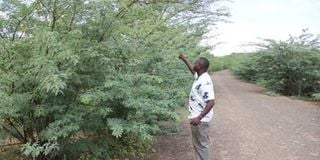Project to turn ‘Mathenge’ into fuel wood starts in Turkana

Prosopis Juliflora, popularly known as Mathenge. Kefri has launched a massive five-year project to manage the Mathenge weed in Turkana and West Pokot counties by putting it to good use. FILE PHOTO | NATION MEDIA GROUP
What you need to know:
- The five-year Kenya Forestry Research Institute (Kefri) programme is meant to control the destructive Prosopis tree species.
- The notorious and extensive tree species Prosopis Juliflora is growing along the banks of Rivers Turkwel and Kerio.
- Prosopis was introduced in Turkana in 1970s as a government policy towards interventions to mitigate effects of drought.
- The plant was chosen for afforestation purposes owing to its resilience and adaptation to desert condition and also being a source of fodder.
A forestry institute has launched a massive project to manage the Mathenge weed in Turkana and West Pokot counties by putting it to good use.
The five-year Kenya Forestry Research Institute (Kefri) programme is meant to control the destructive Prosopis tree species, which is a threat to pasture growth, water points as well as land meant for irrigation.
The notorious and extensive tree species Prosopis Juliflora is growing along the banks of Rivers Turkwel and Kerio.
The project, which focuses on the rehabilitation of degraded areas surrounding Kakuma refugee camp, is aimed at protecting indigenous trees, including different varieties of acacia that are being harvested for firewood.
With the addition of the over 170,000 refugees, there is a serious impact on the ecology. To save the trees, Kefri wants Mathenge used for firewood.
Kefri director Ben Chikamai said the land surrounding the camp had been stripped of trees and vegetation due to the high demand for wood, exposing refugees and locals to harsh climatic conditions.
The Japanese Overseas Forestry Consultants Association is also involved in the project to ensure that locals around the camp at Nadapal, Morung’ole and Kalemchuch use more of the weed.
Kalobeiyei, Lokore, Nakoyol and Pelekech villagers are also directly involved in the project.
Dr Chikamai said over 120 locals have been trained on improved technologies for charcoal making.
“Capacity building for locals in pods utilization and charcoal burning will be relayed to locals through now newly opened Kefri Turkana sub centre.” he said in Lodwar last week.
IMPROVE LIVELIHOODS
Prosopis was introduced in Turkana in 1970s as a government policy towards interventions to mitigate effects of drought and improve livelihood in the dry lands.
The plant was chosen for afforestation purposes owing to its resilience and adaptation to desert condition and also being a source of fodder.
Ms Jane Akiru, a local at Loima Village said that, Prosopis was once viewed as a devil tree but they turn to it when they need a shade, want poles for fences and construction of manyattas as well as medicine.
Other uses locals have thought of is making traditional stools and carvings which is acting as a job opportunities for those selling a stool for as much as Sh2000 depending on the social status of the buyer.
VALUABLE PRODUCTS
Groups are being trained on how to make valuable products such as Prosopis flour from seeds, wine and timber.
Other tree species can be increased of protected through reforestation and controlled grazing.
Deputy Governor Peter Lokoel applauded the establishment of the sub centre saying that the Turkana and West Pokot will now have a centre to turn to when in need of suitable tree species to increase forest cover and how to develop existing ones.
He encouraged locals to utilize Prosopis for fencing.
“Officials at the centre should now ensure better conservation and sustainability of available woodlands and bush lands.” said Mr. Lokoel.





